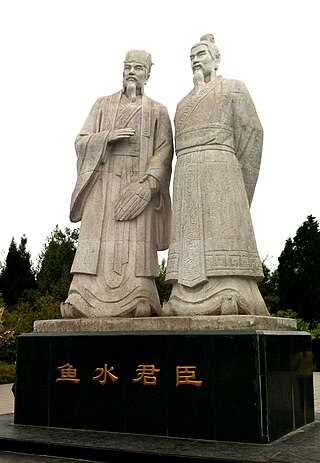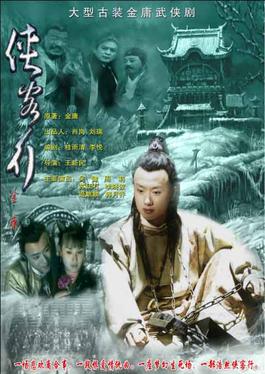Related Research Articles
For most of its history,China was organized into various dynastic states under the rule of hereditary monarchs. Beginning with the establishment of dynastic rule by Yu the Great c. 2070 BC,and ending with the abdication of the Xuantong Emperor in AD 1912,Chinese historiography came to organize itself around the succession of monarchical dynasties. Besides those established by the dominant Han ethnic group or its spiritual Huaxia predecessors,dynasties throughout Chinese history were also founded by non-Han peoples.

The grand chancellor,also translated as counselor-in-chief,chancellor,chief councillor,chief minister,imperial chancellor,lieutenant chancellor and prime minister,was the highest-ranking executive official in the imperial Chinese government. The term was known by many different names throughout Chinese history,and the exact extent of the powers associated with the position fluctuated greatly,even during a particular dynasty.
Zhu is the pinyin romanization of five Chinese surnames:朱,祝,竺,猪 and 諸.

Dai County,also known by its Chinese name Daixian,is a county in Xinzhou,Shanxi Province,China. Its county seat at Shangguan is also known as Daixian. The county has an area of 1,729 km2 (668 sq mi) and had a population of 178,870 at the time of the 2020 census. The county is the home of the AAAAA-rated Yanmen Pass Scenic Area along the Great Wall,as well as the Bianjing Drum Tower,the Ayuwang Pagoda,and the Zhao Gao Forest Park.
The 12th Central Committee of the Chinese Communist Party was in session from September 1982 to November 1987. It held seven plenary sessions. It was succeeded by the 13th Central Committee. It elected the 12th Politburo of the Chinese Communist Party in 1982.
The 11th Central Committee of the Chinese Communist Party was in a five-year session from 1977 to 1982. The 10th Central Committee of the Chinese Communist Party preceded it. It held seven plenary sessions in the five-year period. It was formally succeeded by the 12th Central Committee of the Chinese Communist Party.
The 10th Central Committee of the Chinese Communist Party was in session from 1973 to 1977. It was preceded by the 9th Central Committee of the Chinese Communist Party. It held three plenary sessions in the four-year period. It was formally succeeded by the 11th Central Committee of the Chinese Communist Party.
Hua County or Huaxian is a county under the administration of Anyang City,in the north of Henan province,China.

Shuocheng District,formerly Shuo County,is the main urban district of the prefecture-level city of Shuozhou in Shanxi province,China.

The Water Margin is a 1998 Chinese television series adapted from Shi Nai'an's classical 14th-century novel of the same title. It was produced by CCTV with Zhang Jizhong as producer. It was first broadcast in China in January 1998. The series also featured action choreography by Yuen Woo-ping.

The Legend of the Condor Heroes,also released as Legend of Eagle Shooting Hero and Legend of the Arching Hero,is a Chinese television series adapted from Louis Cha's novel The Legend of the Condor Heroes. It is the first instalment of a trilogy produced by Zhang Jizhong,followed by The Return of the Condor Heroes (2006) and The Heaven Sword and Dragon Saber (2009). It was first broadcast on CCTV in China in 2003.

Ode to Gallantry is a Chinese television series adapted from Louis Cha's novel of the same title. The series was first broadcast on NMTV in China in 2002.

Dai Prefecture,also known by its Chinese name Daizhou,was a prefecture (zhou) of imperial China in what is now northern Shanxi. It existed intermittently from AD 585 to 1912. Its eponymous seat Daizhou was located at Shangguan in Dai County. The territory it administered included all or part of what are now the counties of Dai,Wutai,Fanshi,and Yuanping in Shanxi's Xinzhou Prefecture.

Mingzhou or Ming Prefecture (738–1194) was a zhou (prefecture) in imperial China located in modern northeastern Zhejiang,China,around modern Ningbo. The prefecture was called Yuyao Commandery from 742 to 758.

Dai Commandery was a commandery (jùn) of the state of Zhao established c. 300 BC and of northern imperial Chinese dynasties until the time of the Emperor Wen of the Sui dynasty. It occupied lands in what is now Hebei,Shanxi,and Inner Mongolia. Its seat was usually at Dai or Daixian,although it was moved to Gaoliu during the Eastern Han.

Lake Huangqi,also known by its Chinese name as the Huangqi Hai,is a lake in Chahar Right Front Banner,Ulanqab Prefecture,Inner Mongolia,China.

The Sleuth of the Ming Dynasty is a 2020 Chinese television series based on the novel of the same name by Meng Xishi. Produced by Jackie Chan,it stars Darren Chen,Fu Meng-po and Liu Yaoyuan in the lead roles. The drama premiered on iQIYI with multi-languages subtitles on April 1,2020.

Word Of Honor,previously titled A Tale of the Wanderers (天涯客),is a 2021 Chinese costume streaming television series co-produced by Ciwen Media,and Youku,directed by Cheng Zhi Chao,Ma Hua Gan,and Li Hong Yu,written by Xiao Chu,adapted from the danmei novel "Faraway Wanderers" (天涯客) by Priest. It starred Zhang Zhehan and Gong Jun in the leading roles. The series aired on Youku from February 22 to May 5 with 36 episodes,plus a short bonus clip shows what happened after the end of the main series.
References
Citations
- ↑ Zhao (2019), p. 2058.
- ↑ Zhao (2022), p. 44.
- ↑ Hua & Buell (2016), p. 330.
- ↑ Wang et al. (2012), p. 24.
- 1 2 3 4 Skinner, William (1977). The City in Late Imperial China. ISBN 9780804708920.
- ↑ Liang, Zhangju (1981). 歸田瑣記. Zhonghua Book Company. pp. 136–7. ISBN 9787101017465.
- ↑ Zhou, Zhenhe (2005). 中国地方行政制度史. Shanghai People's Publishing House. p. 206. ISBN 9787208056541.
- 1 2 Zhao, Yicai. "附郭县两千余年的历史变迁". ex.cssn.cn. Retrieved 2018-06-22.
Bibliography
- Li Shizhen (2017), Hua Linfu; et al. (eds.), Ben Cao Gang Mu Dictionary, Vol. II: Geographical and Administrative Designations, Oakland: University of California Press, ISBN 9780520291966 .
- Hua, Linfu; Buell, Paul D. (2016). Dictionary of the Ben Cao Gang Mu, Volume 2: Geographical and Administrative Designations. Univ of California Press. ISBN 978-0-520-29196-6.
- Wang, Chao; et al. (2012), "An Ontology-Based Fuzzy Matching Approach to Semantic Retrieval of Historical Place Names", The Outreach of Digital Libraries: A Globalized Resource Network..., Heidelberg: Springer, pp. 19–28, ISBN 9783642347528 .
- Zhao, Yicai (2019), "Historical Reference and Optimization Reform of the Spatial Subordination Relationship of City and County in China", Geographical Research, vol. 38, pp. 2058–2067.
- Zhao, Yicai (2022), "Two Special Forms of Attached Counties in [the] Traditional Chinese System", Journal of Literature, History, & Philosophy, pp. 44–58.